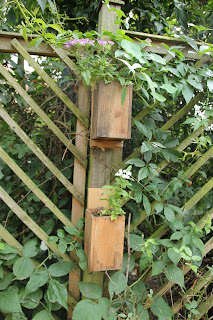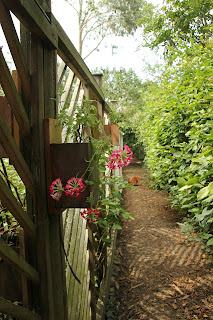These planters are very easy to make with hand tools, look stylish, can be finished with earth pigments to suit your colour scheme and despite their delicate appearance are robust and long lasting. The boxes pictured are in their fourth year of use and have all been kept outside.
Not only are they decorative but practical too in that they can be used to grow edible flowers, herbs and other compact food plants. They are also good at retaining water and encouraging root growth because their design allows for a substantial depth of soil.
MATERIALS
The ubiquitous untreated pallet and fruit crate wood, the latter is the sort that contains oranges and we find it easily at our local organic shop but any similar scrap wood will work.
Wood glueSmall nails or panel pins
screws
CONSTRUCTION
Start by cutting four side pieces from the box wood, you can cut the square for the base at this point or if you'd rather, wait until you have assembled the sides.


Use a pallet block as a support when gluing and nailing the sides.
 Make the planter box in two halves and then join these together. The reason for this is to allow the two right angled sections to support each other for the final assembly.
Make the planter box in two halves and then join these together. The reason for this is to allow the two right angled sections to support each other for the final assembly.
The base of the box can now be cut to fit and then glued and nailed.
On some of my later boxes I used a power stapler, which I found to be quicker.
The boxes can be coated with linseed oil or with a water-based acrylic varnish and we used natural earth and mineral pigments to obtain the colours. We have an article on mixing and using these pigments on this blog (link at the end of this article).
 Cut a piece of pallet wood to use as the backing board for the hanger and also cut a supporting piece, from a square section of pallet wood, make it slightly narrower than the backing board for aesthetic reasons.
Cut a piece of pallet wood to use as the backing board for the hanger and also cut a supporting piece, from a square section of pallet wood, make it slightly narrower than the backing board for aesthetic reasons.
Drill holes into the backing board and screw the supporting piece in place.
Drill a hole at the top of the backing board to enable you to screw it to your chosen support.
Drill a hole at approximately a 45 degree angle into the top of the planter box, so that it can easily be screwed into the backing board.
Lay the box onto the backing board, making sure it is resting on the supporting piece. Then screw the box to the backing board. Thus the vertical weight of the planter is held by the supporting piece. The single screw in the box is just there to hold it in place on the backing board.
Fill with soil and plants.
Fill with soil and plants.
Screw the planter to the support and then sit back and watch it grow!
And now sit back and watch the film.
Please feel free to share this article, comment and/or ask for further information.
Until next time!
Cheers, Andy
© Andy Colley 2017
RELATED ARTICLES
 Using Natural Earth and Mineral Pigments in the Home and Garden
Using Natural Earth and Mineral Pigments in the Home and Garden
The Alchemy of Artists' Materials - whether painting a leaf motif or a
window frame, it's so much more fun than opening a tin of paint...read more
Pallet Wood Garden Gazebo Part 1 - Posts & Framework
We want to spend as much leisure time in the garden as possible. Much as
we love our poultry we do draw the line with sharing our meals with
them...read more
 Pallet Wood Garden Gazebo Part 2 - Trellis and Door
Pallet Wood Garden Gazebo Part 2 - Trellis and Door
The perimeter of the garden gazebo now being complete, the next stage was to make it chicken proof, starting with the door...read more
Make Your Own Indoor Trellis Planter Part 1 - The Base
Many people complain that pallet wood isn't a suitable material for use in anything but rough and ready...read more
Make Your Own Indoor Trellis Planter Part 2 - The Trellis
The trellis back to the planter provides a structure up which climbing
plants could grow and provide us with more space for growing food...read more
RETURN TO GREEN LEVER CONTENTS PAGE FOR MORE ARTICLES
RETURN TO GREEN LEVER CONTENTS PAGE FOR MORE ARTICLES















Hi Andy, these are great, is there a reason why you don't treat or paint the pallet wood?
ReplyDeleteThanks
Hi Andy, love your work
ReplyDeleteAre you living in France?
if so where?
We're living in NZ but thinking of moving to France